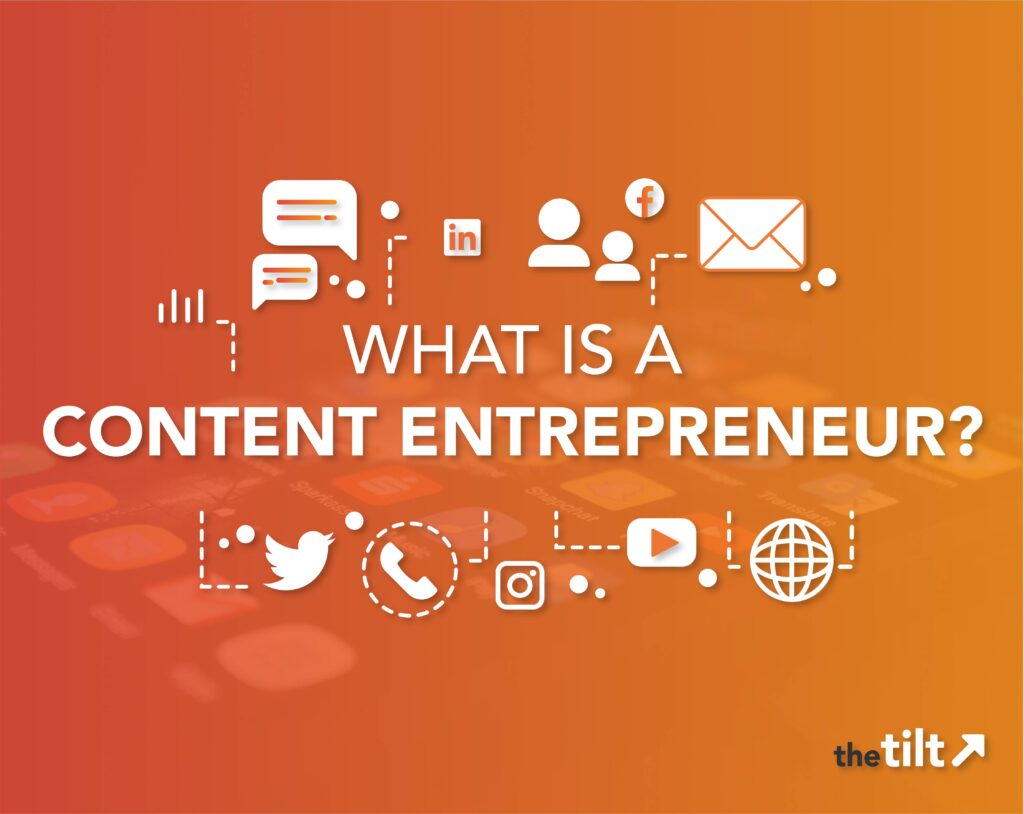
A content entrepreneur:
- Delivers consistent information to a group of people, with plans to build a loyal audience and then monetize that audience over time.
- Creates content to build a long-term, successful business (not as a hobby).
- Begins primarily on one channel (as a podcaster, a blogger, a YouTuber) and then diversifies into many channels.
- Generates revenue from their audience in multiple ways.
Why content entrepreneur? Read below.
Terms are important. I’ve always believed that.
Back in the early 2000s, I was selling custom magazines to senior-level marketers. The term for this industry at the time was custom publishing. Selling “custom publishing” to a marketer was near impossible. The term didn’t speak to them.
So I found a better term to describe what I did: content marketing. The floodgates opened. Marketers were suddenly interested in talking to me simply because I called it something different. Today, content marketing has become THE industry term.
Terms are important.
We are seeing the same thing happen today, but with individual content creators trying to build sustainable businesses.
Ask a content creator or any entrepreneur who develops content full time what they do for a living and it’s like watching my kids parallel park. It’s excruciating.
Oh … there are plenty of terms.
First, there is the creator economy. Signalfire says the creator economy and the passion economy are the same thing: “It’s the class of businesses centered around independent content creators, curators, and community builders including social media influencers, bloggers, and videographers.”
That’s a good start, but most “experts” agree makers who sell things on eBay and Etsy are also part of the creator economy. While this is fine, the business processes of a maker are vastly different than that of a content creator.
If you don’t like “creator economy,” consider passion economy. It uses pretty much the same definition, except that passion is critical to the entrepreneur’s success. The problem here is that passion isn’t critical … it’s just a nice to have. I’ve interviewed dozens of full-time content creators who became multimillionaires, and many of them were not passionate about what they did. Does it help to be passionate about your industry or the content you create? Absolutely. Necessary? Not at all.
Regardless of whether you like creator economy or passion economy, a problem still exists for the content creator asking “how do I describe who I am?” Do you say, “I’m a part of the creator economy?” No one would say that. If you say “content creator,” what exactly does that mean? Does that include every 8-to 12-year-old kid who creates a YouTube video or has done a few TikToks?
Rise of the content entrepreneur
If a content creator is someone who creates content and tries to generate money from that content, what about a content creator who builds a business around that concept?
There definitely is a difference.
In many cases, it’s the distinction between a hobby and a business. When content creation is a hobby, you’re tickled when your YouTube videos deliver $100 in ad revenue. If content creation is a full-time business, build a set of methods and processes so that your video success is repeatable. And scalable…Over a long period of time.
When someone says they’re a content creator, I immediately think it’s a hobby. So, what is a content creator trying to build a sustainable business? A content entrepreneur.
A content entrepreneur is someone who creates content to grow an audience, and eventually makes money from that content they develop. Content entrepreneurs are building a content business, not using content as a marketing tool, side gig or hobby.
The content entrepreneur is the individual driving the passion economy and the creator economy. They are not the content creator, which are a dime a dozen. They are the entrepreneur who’s building the audience-first strategy, buying the technology tools and employing the freelancers.
Ask a child under 18 what they want to be when they grow up, and they won’t say an astronaut or the president. About three-quarters will say they want to be a YouTuber or celebrity content creator.
The majority of new businesses launched today are and in the future will be content-first/audience-first businesses. These individuals will build massive audiences and monetize those audiences in dozens of ways. They will not only make money like media companies do, but they will sell products and services if they wish.
But they won’t do so as just a content creator with a side gig or a hobby.
And it will be challenging for content entrepreneurs to consider themselves part of the creator economy or the passion economy.
But they get content. And they get entrepreneurship. And when their friends or family have no idea what they are doing for a living, those individuals will proudly declare they are content entrepreneurs, which has immediate impact and meaning.
Terms are important. With content entrepreneurship becoming the fastest growing new business type, terms are most definitely important. And once we all start using them together, massive positive change will begin to happen.
We have created a Content Entrepreneur Checklist, including the successful habits of a content entrepreneur. Download it now.





